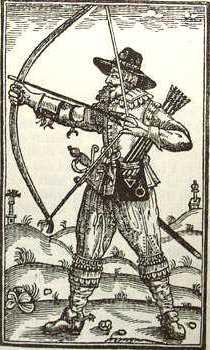Arch puns
The target in archery was called the "clout," and its bull's-eye was either a white circle (the blank*), or a pin which stuck out (the prick*). The ladies in Love's Labour's Lost jest with the men as they practice their archery and wit in preparation for shooting at deer.
During the "hunt," deer were driven towards the archers as they sheltered in a "brake" or thicket. (Though to us this is an astonishingly unsporting activity, it was indulged in by Elizabeth herself.) One variety of deer was called a "pricket," thus offering more punning, and of course deer were horned, which allowed much "horn-humour"* as well.
In this passage, the vagueness of "it" and "mark" allow the inevitable phallic image of a bow hitting the target to become sufficiently bawdy that Maria disapproves:
Rosaline: Well then, I am the shooter.
Boyet: And who is your deer?
Rosaline: If we choose by the horns, yourself. . .
Maria: You still wrangle with her, Boyet, and she strikes at the brow.
Boyet: But she herself is hit lower. Have I hit her now? . . .
Maria: A mark marvellous well shot, for they both did hit it.
Boyet: A mark, O, mark but that mark! A mark says my lady!
Let the mark have a prick in't, to mete [aim] at if it may be. . .
Maria: Come, come, you talk greasily; your lips grow foul.
(4.1.116-39)
Footnotes
-
Lear targets Kent
Lear warns Kent to stay out of the argument between him and Cordelia: "The bow is bent and drawn; make from [avoid] the shaft." Kent replies, "See better Lear, and let me still remain/The true blank of thine eye" (1.1.143,158-59).
-
The "prick"
Any small mark, such as the divisions on a clock marking the hours, was also called a "prick." ("The bawdy hand of the dial is now upon the prick of noon"--Romeo and Juliet, 2.4.117-18).
-
Cuckolds
The husband whose wife was unfaithful (a cuckold) was supposed to have imaginary horns growing from his head. There is much horn-humour in Shakespeare's comedies, and horn-anxiety in such plays as Othello and The Winter's Tale.
